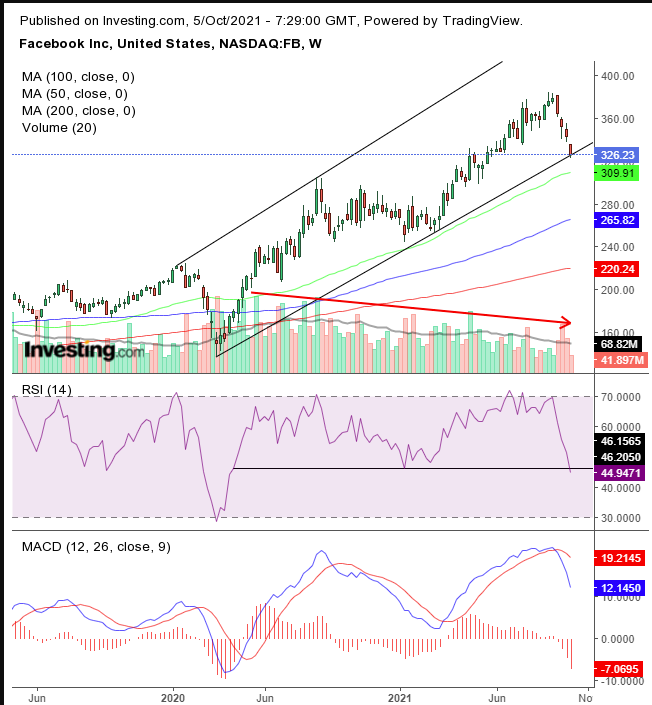Technology bulls were hammered on Monday as the sector's stocks were pressured by investor worries about rising yields and what that might signal regarding higher rates. The tech-heavy NASDAQ index was yesterday's worst performer among the US major indices, down more than 2% at the close.
But sector stalwart and FAANG component Facebook (NASDAQ:FB) had an even worse day. Shares of the social media behemoth, which lost almost 5% at the finish, faced two additional headwinds specific to the company itself. Just before midday Monday ET, all of Facebook's platforms, which include WhatsApp and Instagram, suffered a global outage, taking the company—whose apps are utilized by nearly 3.5 billion users—down for nearly six hours. That was the longest time in memory that Facebook was out of commission.
Adding to the pressure on the Menlo Park, California-based company, the blackout came on the heels of a whistleblower, former employee Frances Haugen, providing the SEC and the Wall Street Journal with thousands of documents allegedly demonstrating that FB prioritized profits over protecting its users.
Though FB's Chief Technology Officer Mike Schroepfer tweeted an apology, investors weren't even remotely mollified. The stock was sold off, extending a rout to its fourth consecutive day for a total 13.85% loss. That's FB's worst slump since the March 2020 bottom.

Having now dropped more than 10%, the stock has officially entered correction territory. Will this profit-taking satisfy investors, allowing FB shares to resume its uptrend, or is this the beginning of a larger move, which could flirt with the 20% bear market threshold?
Note, even as the stock plummeted, it found precise support by its uptrend line. The price dipped slightly below this support line, but just briefly, before closing above it. From that perspective this might then prove to be a buying dip, affording an ideal entry point, as the price is smack on the support, after having confirmed it to boot.
On the other hand, the RSI inched below its previous peak, suggesting the price may be losing momentum. That doesn't mean the slight decline of the RSI below its support makes it impossible for the indicator to bounce back, along with the price, off its uptrend line, itself supported by the 50 DMA.
Still, the price failed to reach the top of its rising channel, arguably demonstrating weakness. Conversely, however, the current selloff’s volume has been dropping each day, increasing the odds that the rout may be running out of energy.
This would confirm the price finding support by the uptrend line and signal that the RSI may, in fact, rebound. The MACD, however, provided a sell signal, as the short MA crossed below the long MA. That would concur with the price’s negative divergence throughout the rally equity's since the March 2020 bottom.
Of course, it’s impossible to know which indicator will prove more accurate since each gauge may provide different signals, given that any one that fairly represented the market at the time can suddenly turn. Remember, technical analysis is not about knowing what will happen.
Rather, it simply attempts to reflectaspects of supply and demand from particular points of view. A technician attempts to weigh the evidence and operate on a statistical basis.
Trading Strategies
Conservative traders should wait for the price to make a new high, then fall again toward the bottom of the channel and prove support.
Moderate traders would buy after a bullish candle.
Aggressive traders could buy now, having accepted the added risk proportionate to the higher reward that goes with moving before the rest of the market.
Trade Sample – Aggressive, Long Position
- Entry: $325
- Stop-Loss: $320
- Risk: $5
- Target: $350
- Reward: $25
- Risk:Reward Ratio: 1:5
